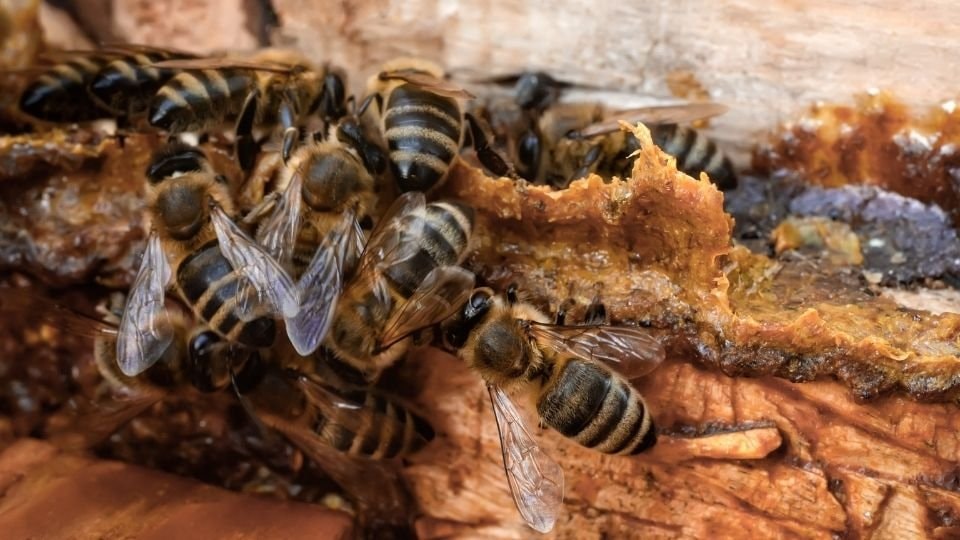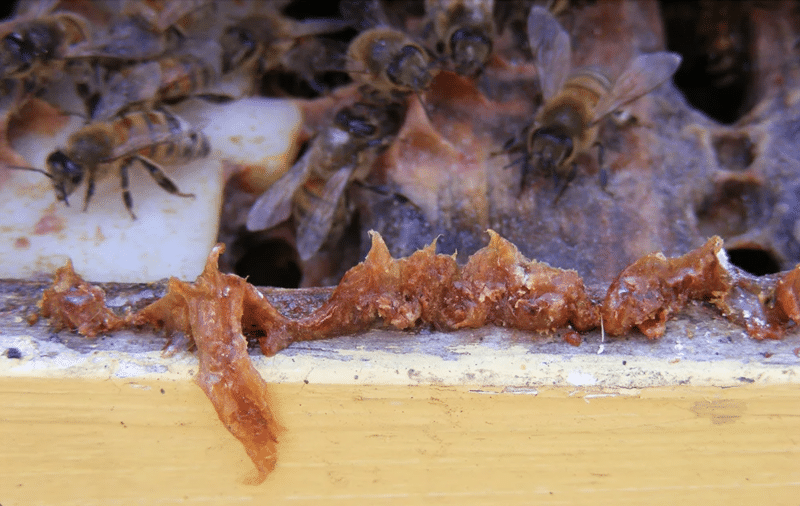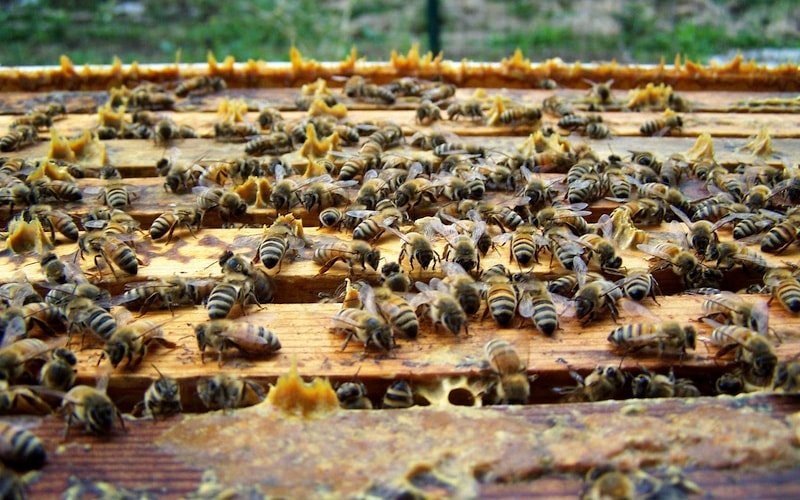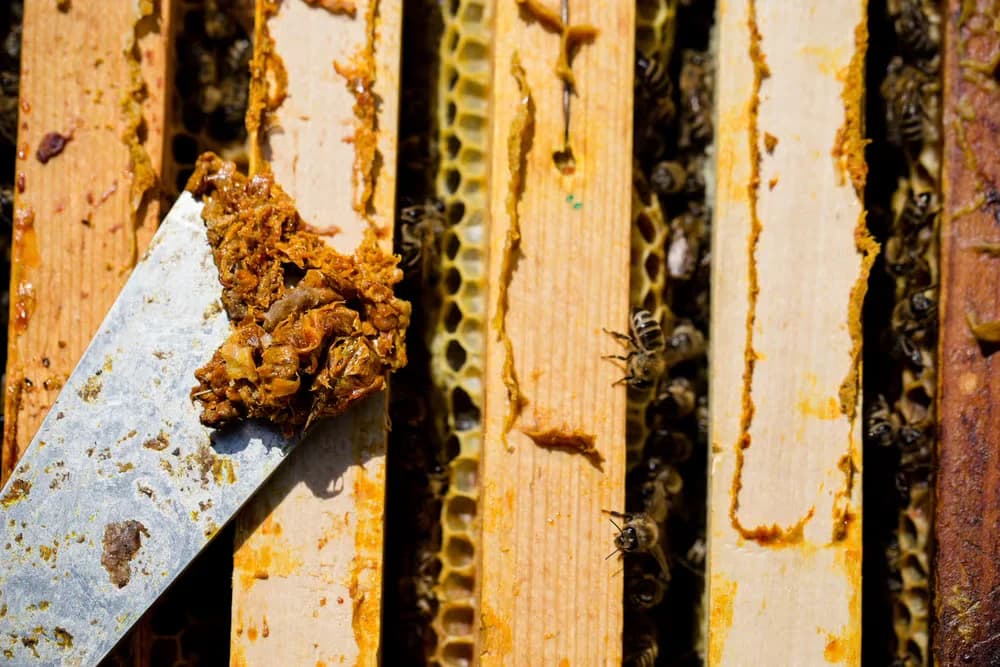Propolis - pro- "for", -polis "the city"
Along with pollen, nectar, and water, honey bees collect resins from plants and trees. The bees load these sticky resins into the pollen baskets on their hind legs and carry them back to the hive. Once they enter the hive, we call these resins propolis. Pro- means fr, or in front of, and -polis means the city, and indeed propolis is used to protect the “city” of bees.
Honey bees aren’t the only bees that use resins in their nest. Many species of solitary bees use resins to line the small cavities where they lay their eggs. Stingless bees, a diverse group of social, honey-producing bees found in tropical areas, also incorporate propolis into their nest environment.
Propolis can be used to smooth rough surfaces and seal crevices, which allows the colony to control airflow and maintain homeostasis inside the hive.
Propolis has also been found to have antimicrobial properties. When a colony is sick, bees collect extra propolis to fight off infection. In this way, propolis use by honey bees can be considered an example of social immunity: a collective behavior that benefits the health of the colony as a whole.
Propolis is a high-quality bee product with a complex chemical composition. Thousands of years ago, people recognized the healing properties of this bee product and used it for medical purposes. It is an aromatic, sticky, resinous substance that worker bees collect from plants and trees, incorporating their enzymes into it. Propolis protects bees from diseases and is used to disinfect the inside of the hive.
Chemically, propolis is a complex mixture of bioflavonoids, pollen, plant resins, wax, balsam, tannins, essential oils, vitamins E and B, iron, zinc, enzymes, and minerals. It has been scientifically proven that propolis is a pure antibiotic and does not cause harmful reactions in the body. Bacteria do not develop resistance to propolis. It is considered the strongest natural antibiotic and antiseptic, often used for inflammations.

Propolis has antitumor, anabolic, regenerative, and anesthetic effects. It acts on all types of pathogenic organisms. It quickly heals throat and stomach problems. It is most commonly used in the form of an alcoholic solution (tincture).
The ancient Jews considered tzori (the Hebrew word for propolis) as a medicine. Tzori and its therapeutic properties are mentioned throughout the Old Testament; the biblical Balm of Gilead is nearly indistinguishable from propolis. The Incas employed it as an antipyretic agent. Ancient Greeks and Romans used propolis as a remedy for skin diseases, wounds, and infections, and it was also included in the English pharmacopeia in London in the 17th century. From the 17th to the 20th century, propolis enjoyed popularity in Europe as an antibacterial agent, and during World War II, the Russians used it in the treatment of tuberculosis because they noticed it eased lung problems and improved appetite.
Propolis is especially recommended for disease prevention, appetite loss, colds, and flu, and treats digestive, respiratory, and gynecological organs, aphthae, gastritis, ulcers, rhinitis, asthmatic bronchitis, etc. Thanks to active flavonoids, propolis acts as an antioxidant, slows down the aging of body cells, and generally protects the body from carcinogenic diseases.
Propolis tincture has a proven positive effect on regulating blood pressure and everything related to blood circulation and circulation. The propolis tincture is recommended for therapy against various inflammations, especially against intestinal diseases. It restores intestinal flora.
Propolis is an excellent natural product for boosting immunity, providing maximum protection for the body, and increasing antibody production.
Today, propolis is most commonly used as an alcoholic solution and can also be used as a non-alcoholic solution for children. Propolis spray is very practical because it covers the oral cavity and throat well, allowing for better absorption of the active components of the medication.
Benefits to the Hive
Often, propolis serves to provide structural support to the hive, smoothing rough surfaces, blocking alternate entrances from intruders, and filling unwanted cracks.
But propolis also has sanitary and health benefits, many of which the bees are cognizant of. For example, when a large intruder occupies a hive, the colony will sting it to death and cover its carcass with propolis since it is too large to physically remove.
Recent research has helped us understand the many antifungal, antibacterial, and antiviral properties of propolis, though much is still unknown. Researchers Marla Spivak and Renata S. Borba of the University of Minnesota Department of Entomology published a study in 2017 that supported the effect of propolis against pathogens contributing to American foulbrood (AFB) disease.
Dr. Spivak’s research on propolis' health benefits has demonstrated the importance of social immunity in overall colony health and productivity. Whereas individual bees exhibit individual immunity through cell phagocytosis and others, the use of propolis in a hive serves as an example of social immunity to protect the overall population from parasitic attacks.
By reducing the amount of opportunistic pathogens in a hive, propolis decreases the level of immune response by bees. In this way, bees do not have to exhaust as much energy into fighting infection as they would without the presence of propolis.
As an illustration, the difference in health and productivity would be similar to a fully healthy adult versus one living with a constant cold. The sick adult, with an activated immune response and its taxing symptoms, will certainly not be as effective for society as the healthy one.
Scientific Research Conducted About Propolis

The first scientific work with propolis was published in 1908 and included its chemical properties and composition. Due to its possessing a broad spectrum of biological activities, it has gained significant scientific and commercial interest over the last two decades.
In their article “Lessons from Exploring Chemical Space and Chemical Diversity of Propolis Components”, published in 2020 in the International Journal of Molecular Sciences, authors Trong et al searched for the number of scientific publications and patents containing the word “propolis” per decade going back to 1900:
- In the years between 1991 and 2000, they found 919 publications and 412 patents. From 2001 through 2010, they found 3.5k publications and 1.4k patents.
- For the years between 2011 and 2019 (the year before the publication of the article), the team found 8,812 publications and 4,455 patents.
Unlike many ‘natural’ remedies, there is a substantive database on the biological activity and chemical composition of propolis indicating that it may have many antibiotic, antifungal, antiviral,l and antimicrobial properties, among others.
One 2019 review notes that propolis may stimulate collagen production in the skin, which, in addition to its anti-inflammatory and antimicrobial properties, supports wound and burn healing. The same review also reported that propolis may possess neuroprotective effects against multiple sclerosis (MS), Parkinson’s disease, and dementia.
A different study found that when topical propolis was applied three times a day, it helped heal cold sores faster than no treatment. The researchers found the propolis cream not only reduced the amount of herpes virus present in a person’s body but also protected the body against future cold sore breakouts.
A 2021 review found that, due to propolis’ antibacterial and anti-inflammatory properties, it can help treat mouth and throat infections, as well as cavities.
Another 2021 study investigated propolis’ potential for treating certain cancers as well. The study found that propolis may keep cancerous cells from multiplying, reduce the likelihood that cells will become cancerous, block pathways that keep cancer cells from signaling each other, and reduce side effects of certain cancer treatments, such as chemotherapy and radiation therapy.
A 2022 review suggests that propolis may have implications in the prevention and treatment of type 2 diabetes; it’s thought that its flavonoids may help control insulin release. A different study from 2017 reported that ingesting a propolis supplement improved glycemic control in patients with type 2 diabetes.
Still another study, this one from 2015, noted that propolis exerts antioxidant, anti-inflammatory,y, and analgesic effects that may improve diabetic complications.
Several studies have pointed to propolis being beneficial when used to treat cognitive impairment, neurodegeneration, and neurological disorders because of its anti-inflammatory, antioxidant, and immunomodulatory properties.
Potential uses
Modern research suggests that propolis may be useful for:
- minor wounds
- oral hygiene
- inflammation
- cold sores
The following sections will look at some of this research in more detail.
Wound healing
One 2015 reviewTrusted Source suggests that propolis may aid wound healing. An animal study in rats with diabetes showed that propolis helped the skin grow new cells to repair itself.
Because people with diabetes can experience slow wound healing, this suggests that propolis could be beneficial for helping the skin heal more quickly. As propolis also kills some types of bacteria, it may also help prevent infection.
Doctors may recommend it as an alternative treatment for skin burns or diabetic ulcers. However, there needs to be more evidence that describes propolis use for wound healing.
Oral Health
According to the same 2015 review Source, propolis also appears to prevent the formation of calcium phosphate, which is the main component of dental plaque.
Propolis and honey are also antibacterial, which may make them useful as ingredients in dental care products.
According to one small study in the review, propolis significantly decreased the amount of bacteria in the saliva of people with periodontitis.
Inflammation
The antioxidants in propolis may work to reduce inflammation, such as the inflammation that arthritis causes.
Animal Studies Source has tested propolis as an anti-inflammatory agent in rats and mice with arthritis. In both studies, the propolis inhibited swelling and appeared to have an impact on how the inflammation developed.
Scientists believe that propolis may regulate inflammatory substances in the body, such as prostaglandins.
Herpes
A systematic review in the journal Complementary Therapies in Medicine suggests that propolis may work as an alternative treatment for genital or oral herpes.
Herpes is caused by the herpes simplex virus (HSV). HSV-1 typically causes oral herpes, which can result in cold sores. HSV-2 is sexually transmitted, and it causes an infection that can result in painful blisters on the genitals.
In the review, researchers analyzed several trials of honey and propolis, comparing their effects with those of acyclovir, which is a common HSV medication. In 4 out of 6 trials, propolis was more effective than acyclovir for treating HSV skin lesions — particularly cold sores.
However, the researchers did not include a large number of trials in this review.
 Insufficient evidence
Insufficient evidence
Although people have used propolis for many health conditions in the past, there is not strong scientific evidence to support all of them.
The following sections will look at some of these health conditions in more detail.
Diabetes
According to the 2015 review Trusted Source, one older study in rats found that propolis was associated with lower blood sugar levels. However, this is not enough evidence to show that propolis can help with managing diabetes in humans.
Cancer
Laboratory studiesTrusted Sources suggest that the compounds in propolis may inhibit cancer cell growth or induce cell death in cancer cells.
Some in vivo tests have shown that flavonoids from propolis can inhibit the development of oral cancer, lung cancer, skin cancer, breast cancer, and more.
However, much of the research in this field has involved isolated cells or animal models.
COVID-19
One 2020 study in the journal Phytotherapy ResearchTrusted Source argues that propolis’s antiviral properties may mean that it works against SARS-CoV-2. This is the coronavirus that causes COVID-19.
Previous laboratory studies have shown that propolis exhibits antiviral activity against other types of virus, including:
- rhinoviruses
- influenza (flu)
- respiratory syncytial virus
Propolis also appears to help stimulate the immune system. For these reasons, the researchers suggest that propolis may help with preventing SARS-CoV-2 infection.
However, while clinical trials on propolis’s ability to prevent COVID-19 are underway, there is currently no evidence to suggest that it is effective for this purpose.
Allergies
One study in the journal Oxidative Medicine and Cellular LongevityTrusted Source notes that propolis contains compounds that may have an anti-allergy effect on the body.
Some people may feel a benefit from using propolis for this purpose. However, there is not much scientific evidence to prove that propolis can help reduce allergy symptoms.
Reduces Acne Breakouts
Propolis’ anti-inflammatory and antibacterial properties may make it a promising alternative treatment for acne. A study of 40 participants with acne found that propolis ethanolic extract can effectively treat acne vulgaris. The study also found that it was well-tolerated and safe. The participants responded well to treatment but did develop mild irritation. More studies are needed to determine propolis’ application in different skin diseases.
Safety
Propolis appears to be a safe Source for humans to use, at reasonable doses, both on the skin and internally. Reports of allergic reactions are rare, and there are no recorded cases of toxicity.
However, because propolis can contain a wide variety of compounds depending on where it comes from, it is not always possible to be sure of its contents.
When looking for propolis products, check that the manufacturer has carried out outhired-party testing to verify that the propolis is pure and safe to use.
Always speak with a doctor before trying new supplements.
How to use propolis
People can use propolis in several ways, including:
- as an oral supplement
- diluted in water as a mouthwash
- topically on the skin
Before using propolis, it is best to seek the advice of a doctor to check that it will be safe for an individual to use. Then, the person should patch test some propolis to make sure that they do not have an allergy to it.
For use on the skin, apply pure propolis or a skin product that contains propolis as an active ingredient.
For use in the mouth, dilute a small amount of propolis in water. Rinse the mouth or gargle the mixture for a while before spitting it out.
Many premade products contain propolis as an active ingredient. In these cases, use the product as instructed on the label.
Dosage
A 70-milligram daily dose of oral propolis appears to be safe for humans.
Adults have also mostly taken propolis in doses of 400-500 milligrams per day for up to 13 months.
Can You Take Too Much Propolis?
You should always follow the manufacturer’s instructions and your healthcare provider’s recommended dose. High doses may not be safe, especially if you’re receiving other treatments and you are breastfeeding.
According to a 2015 study, propolis is usually well-tolerated and not associated with cases of toxicity.
If you develop any concerning side effects, consult your healthcare provider right away.
Side Effects of Propolis
There isn’t enough information about the short and long-term side effects of propolis, but you should avoid using propolis if you are allergic to honey and bee products.
If you're undergoing surgery, your surgeon may advise stopping propolis treatment before your appointment, as it can increase your risk of bleeding.
Propolis-based mouthwashes may cause:
- Teeth staining
- A burning sensation
- A bitter taste
It may also lead to irritation in patients with acne.
Always follow your doctor’s advice, as propolis can interact with medications and increase the risk of blood clotting.
Are there different forms of propolis?
Propolis is not fully soluble in water, so extraction is usually done using alcohol or oil. It is, however, possible to extract some parts of it in a water solution, however, this is not available to purchase due to its short shelf life. Propolis can however be used raw, in chunks, or turned into powder. It is often easiest to use once extracted or powdered.
- Propolis tincture (used for consumption and topically)
- Powdered propolis (used for consumption and to make cosmetics, creams and capsules)
- Propolis in oil (used for cosmetics)
- Raw chunks of propolis (used to make a tincture, oi,l, and powder)
Where To Find Propolis
You can buy propolis oral tablets and capsules, powder, and lozenges. You can also find ointments, creams, or lotions that are applied to your skin. Most of these products are found online or at health food stores.
Here are some suggestions for your propolis treatment:
Beekeeper's Naturals Propolis Throat Spray
Beekeeper's Naturals Nasal Spray for Adults with Propolis
BEE and You, Propolis Liquid Extract Drops
Bee Propolis from Dr. Danielle
Propolis 2000mg with ZINC
